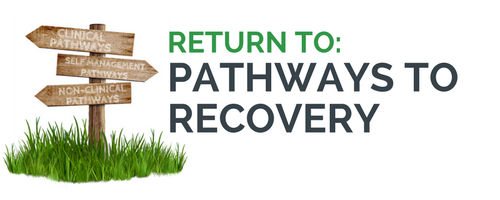
Education-Based Recovery Services
Education-based recovery support services are designed to help individuals in early substance use disorder recovery achieve their educational goals while also focusing on the areas of their social, emotional, spiritual, and physical well-being needed to help sustain recovery.
Education-based recovery support services are offered both at the university and high school levels, described in greater detail below.
UNIVERSITY LEVEL
Collegiate Recovery Programs (CRPs; also called Collegiate Recovery Communities) provide seamless access to recovery-related social and other educational supports for college students in recovery. While the services provided may vary by location, most programs offer onsite sober housing, mutual-help organization meetings (e.g., Alcoholics Anonymous), individual counseling, sober events, and seminars on topics relevant to their day-to-day needs (e.g., coping with stress in recovery). These activities are intended to help college students meet their educational goals while maintaining a focus on their emotional and physical well-being, all in the context of substance use disorder recovery.
Individuals 18-25 years old have rates of substance use disorder two to three times greater than older adults, and comprise 20% of addiction treatment patients in the United States. Therefore, it follows that universities are increasingly offering these innovative recovery support service packages, with a current total of more than 138 programs across the US. Individuals must typically have initiated abstinence (e.g., for at least 3 months or longer) to be eligible for collegiate recovery programs, though many also welcome individuals who are seeking recovery or are interested in learning more (“newcomers”) to program events and activities.
HIGH SCHOOL LEVEL
Recovery high schools are designed to integrate academic instructions with social-emotional skills acquisition and support for teenage high school students in recovery from substance use disorder. Based on the most recent evaluation by the Association of Recovery Schools (see below), there are currently 42 recovery high schools across 20 U.S. states, with an additional five schools in development.
While recovery high schools may differ in their scope of services and support, there are three primary aims shared by these education-based recovery support services:
- To educate all available and eligible students who are in recovery from substance use disorder or co-occurring disorders (e.g., anxiety and mood disorders, attention-deficit/ hyperactivity disorder, etc.)
- To meet state requirements for awarding a secondary school diploma
- To support students in working a fulfilling program of recovery
PROMINENT ORGANIZATIONS
- The Association of Recovery in Higher Education (ARHE) is the only association exclusively representing collegiate recovery programs (CRPs) and communities (CRCs), the faculty and staff who support them, and the students who represent and participate in them. ARHE also serves as a national support for supporting and disseminating the vision of collegiate recovery programs. See here for a list of Collegiate Recovery Programs by U.S. region.
- Association of Recovery Schools: While there is no central organizing body for recovery high schools, the Association of Recovery Schools produced ‘The State of Recovery High Schools‘ in 2016. This report describes the current landscape of recovery high schools in the United States (e.g., number and location). It also defines the essential characteristics of these youth recovery and educational support services, and summarizes existing services for youth by state, helping to assist those who are interested in starting a new recovery high school in their area. In addition, the report identifies challenges to administrators and other leadership at recovery high schools (e.g., increasing diversity) and characterizes student engagement and well-being.
WHAT DOES THE SCIENCE SAY ABOUT EDUCATION-BASED RECOVERY SERVICES?
Regarding collegiate recovery programs, while students involved in these programs typically have low documented relapse rates (often defined as any drinking or other drug use), their overall effectiveness, for example, through comparing participants to non-participants also in substance use disorder recovery, is not known scientifically. A survey of nearly 500 students from 29 collegiate recovery programs across 19 U.S. states showed the average student was 25 years old and abstinent from alcohol and other drugs for 2.7 years. 9 in 10 considered themselves to be “in recovery,” 83% received addiction treatment, and 93% had attended a 12-step mutual-help organization. Approximately 85% rated both their physical and mental health as either “good” or “very “good.” Systematic, rigorous evaluations of these potentially critical recovery support services for college-aged youth are needed.
Very little is also known empirically about outcomes of students attending recovery high schools. Importantly, a rigorous study, with sophisticated statistical analyses to try and isolate the causal impact of recovery high school attendance showed that adolescents with substance use disorder post-treatment attending these recovery support services were 4 times more likely to report complete abstinence from alcohol, marijuana, and other drugs at 6-month follow-up versus those attending standard high schools. These recovery high school students also reported 17 fewer days of marijuana use and 3 fewer days of alcohol use in the 90 days leading up to the 6-month follow-up.
KEY READINGS
- List of Key Readings
-
- Bulletin Article: Collegiate settings can trigger relapse
- Harris, K. S., Baker, A. K., Kimball, T. G., & Shumway, S. T. (2008). Achieving systems-based sustained recovery: A comprehensive model for collegiate recovery communities. Journal of Groups in Addiction & Recovery, 2(2-4), 220-237. doi: 10.1080/15560350802080951
- Laudet, A. B., Harris, K., Kimball, T., Winters, K. C., & Moberg, D. P. (2015). Characteristics of students participating in collegiate recovery programs: A national survey. Journal of Substance Abuse Treatment, 51, 38-46. doi: 10.1016/j.jsat.2014.11.004
- Moberg, D. P. & Finch, A. J. (2008). Recovery high schools: A descriptive study of school programs and students. Journal of Groups in Addiction & Recovery, 2, 128-161. doi:10.1080/15560350802081314

